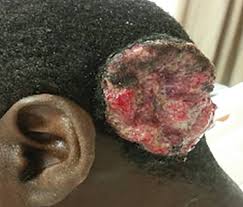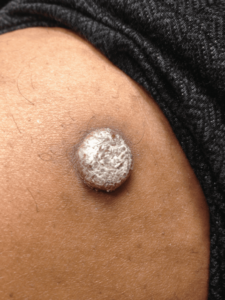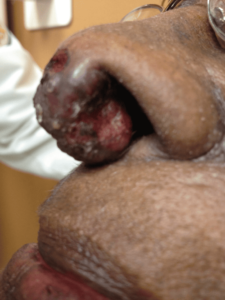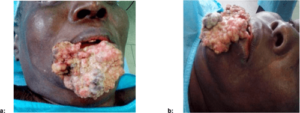Author's details
- Dr. Khashau Eleburuike
- MBBS (Ilorin) MSc. Global Health Karolinska Institute.
- Resident doctor in family medicine in Northern Sweden.
Reviewer's details
- Dr. Gboyega Olarinoye
- MBBS, FMCP.
- Dermatologist FMC Keffi Nassarawa State. Nigeria
Squamous Cell Carcinoma
Squamous cell carcinoma (SCC) in darker-skinned individuals often presents as firm, scaly, or ulcerated lesions, sometimes appearing darker or thicker due to the skin’s pigmentation, and is commonly found in areas of chronic inflammation or scarring rather than sun-exposed skin. While SCC is less frequent in darker skin tones, it can be more aggressive and is often diagnosed at a more advanced stage. Treatment includes surgical excision, Mohs surgery for high-risk areas, cryotherapy, or radiation therapy, with early detection improving outcomes and reducing the risk of metastasis.

https://www.consultant360.com/articles/case-squamous-cell-carcinoma-scalp-african-man

https://link.springer.com/chapter/10.1007/978-3-030-31485-9_10#Sec4

https://link.springer.com/chapter/10.1007/978-3-030-31485-9_10#Sec4

Related Topics
- Komenan Kassi and Ildevert Patrice Gb{\’e}ry and K. Kouam{\’e} and Kouam{\’e} Alexandre Kouassi and J. M. Kanga. Squamous Cell Carcinoma of the Lower Lip in an Old Black African Woman. 2015 Nov.
- Gupta AK, Bharadwaj M, Mehrotra R. Skin Cancer Concerns in People of Color: Risk Factors and Prevention. Asian Pac J Cancer Prev. 2016 Dec 1;17(12):5257-5264. doi: 10.22034/APJCP.2016.17.12.5257. PMID: 28125871; PMCID: PMC5454668.
- Nickul N. Shah MD, Roland Purcell MD, Albert Cooper MD, and David Roman R. A Case of Squamous Cell Carcinoma of the Scalp in an African Man. 2016 August;56(8).
- Gloster Jr HM, Neal K. Skin cancer in skin of color. Journal of the American Academy of Dermatology. 2006 Nov 1;55(5):741-60.

